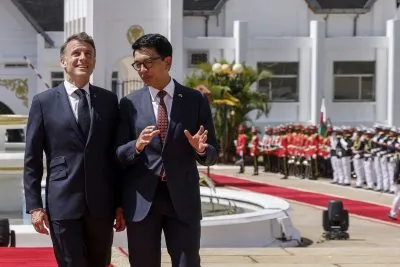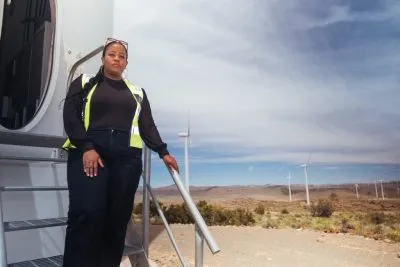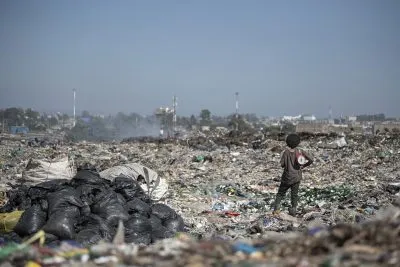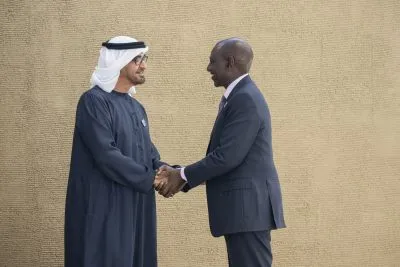Shell’s decision to pull back from South Africa’s shale industry has reignited a debate over the future of fracking in the country.
When Eskom executives are summoned to Cape Town for their next parliamentary grilling, the journey from Johannesburg will offer more than a chance to dwell on the utility’s boardroom battles.
The flight over the Karoo – the vast semi-desert of the country’s southwest – presents a tantalising glimpse of a future powered by the region’s huge reserves of trapped shale gas; a potential panacea for South Africa’s stricken power sector.
That vision now seems more like a desert mirage, after Shell announced that it is pulling back from its South African shale projects, citing regulatory delays and depressed global energy prices.
The oil major’s public stance suggests that patience is wearing thin among industry players who have been waiting up to six years for regulatory certainty. However, widespread environmental concerns and a decision to engage with the Karoo’s communities have led others to sympathise with the government’s approach to fracking – a controversial process that attracts scrutiny well beyond South Africa’s borders.
The US Energy Information Administration estimates that South Africa holds 11tr cubic metres of technically recoverable shale gas, a world-class deposit which industry backers say could help alleviate South Africa’s reliance on imported fuel.
Hydraulic fracturing – the process of releasing gas by pumping pressurised liquid into the ground – has attracted the ire of environmentalists from the south of England to the US’s vast Appalachian Basin, with particular criticism focusing on the alleged poisoning of groundwater.
In response to such concerns, and under pressure from local organisations, such as the Treasure Karoo Action Group, the South African government placed a moratorium on exploration in 2011.
That freeze ended in late 2012, but discussions over key legislation, depressed energy prices and an ongoing community consultation process continue to prevent exploration from taking place.
“I think there’s still a lot of hope, though at this time it’s not progressing as we would have expected,” says Elias Pungong, African oil and gas leader at Ernst & Young.
“It doesn’t have any bearing on the long-term sustainability of the project, because the resource is there – and the government is ensuring that oil companies can explore in a responsible manner.”
That consultation process, currently under way, seeks to gather the opinions of Karoo-dwellers towards the new developments – but industry hopes of a speedy resolution could be disappointed.
Lindiwe Mekwe, acting chief executive of Petroleum Agency SA – a government entity responsible for implementing legislation – says that the consultation will be a two-way process, harvesting the views of Karoo communities and feeding them back into the legislative process.
“To be safe I will say [it will take] four months. It will actually depend – the consultation will have to hear the views of the communities. [It may be] quite a long time and they may have to go back to the drawing board and amend certain provisions that will actually be incorporated,” she says.
For now, the agency says that it is busy processing applications for shale exploration, but insists that the industry largely understands the time-consuming approach to community consultation.
In the case of Shell, who pointed to delays in obtaining their exploration licence as a critical factor, that may be wishful thinking. But other industry figures are content to give a more sympathetic hearing to government, even if there is a hint of frustration regarding the pace of developments.
“The industry is content with the process, but it would have been better if we were a lot further, because it’s taken about six years and some of the original shale gas licence applications have not been processed,” says Ebrahim Takolia, chief executive of the South African Oil and Gas Alliance, an industry group.
“We understand that there needs to be a process because South Africa has never explored for shale before, but its something that we just have to deal with as a country.”
Industry restlessness does appear to be having an effect. On the day of Shell’s public statement, South Africa’s mining minister Ngoako Ramatlhodi was quoted by Reuters as saying that the country expects to start issuing licences by the end of the year. That timeline seems reasonable to Lizel Oberholzer, a Cape Town-based oil and gas lawyer with Norton Rose Fulbright, who sees no further obstacles in the way of the process.
Yet delays over licences are not the only block on exploration. Complicating matters further is the fact that the industry is regulated under the country’s Mineral and Petroleum Resources Development Act (MPRDA), a catch-all piece of legislation that principally covers the country’s ever-controversial mining sector. The act currently leaves shale explorers exposed to a 20% free-carry claim from government – an amount that the Petroleum Agency’s Mekwe says is in line with international norms.
“I haven’t heard any qualms from business in terms of that, they have welcomed that because apparently it has been the international norm and practice…What South Africa is proposing is not that much compared to what other countries are seeking in relation to state participation,” she says.
That is contested by Ernst & Young’s Elias Pungong, who argues that there is deep industry disquiet about surrendering a significant part of their investment.
“That clause is of concern to the industry, and that is a fact, because everywhere there’s been a lot of discussions and voices have been raised… the government should move to address it,” he says.
In a country where the spirit of the ANC’s 1955 Freedom Charter – and its clauses relating to public ownership of “mineral wealth beneath the soil” – continue to command influence, the level of private involvement in South Africa’s resources is always likely to prompt fierce legislative debate. But with the MPRDA being sent back to parliament for further consultation, there is hope in the shale industry that controversial provisions such as the free-carry demand could be diluted.
“Those issues are being dealt with through a process, it’s in the public domain, it puts forward some of the concerns and the 20% free carry was recognised as a concern. But it also depends on how you apply it, and that’s where the discussions are taking place,” says SAOGA’s Ebrahim Takolia.
Government clarity on legislation will undoubtedly play a part in the successful development of a South African shale industry. But external factors are also likely to play a significant role – not least international energy prices.
Critically low oil prices, prompted by a Saudi Arabian supply glut targeting US shale firms, have forced many marginal producers out of the market. Until such a time as prices recover, the South African shale bonanza will continue to be spoken of in the future tense. A recent WWF (World Wide Fund for Nature) report argues that the “full commercial exploitation of shale gas in South Africa seems like a distant, if not unlikely, prospect.”
But for Takolia, the depressed international environment offers a great opportunity for industry and government to sit down, focus minds, and plan a sustainable path forwards. “While the industry is challenged, this may be a good time to put together a good set of legislation that promotes upstream oil and gas development, so we can proceed going forwards once the market turns,” he says.
David Thomas
Want to continue reading? Subscribe today.
You've read all your free articles for this month! Subscribe now to enjoy full access to our content.
Digital Monthly
£8.00 / month
Receive full unlimited access to our articles, opinions, podcasts and more.
Digital Yearly
£70.00 / year
Our best value offer - save £26 and gain access to all of our digital content for an entire year!
 Sign in with Google
Sign in with Google 


